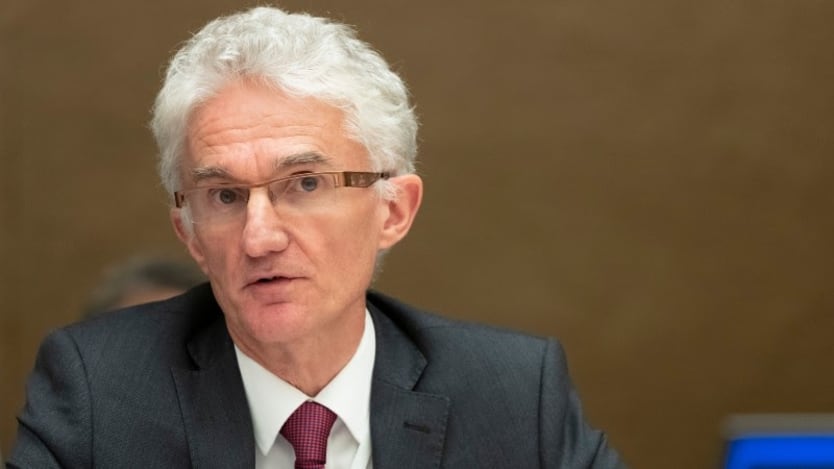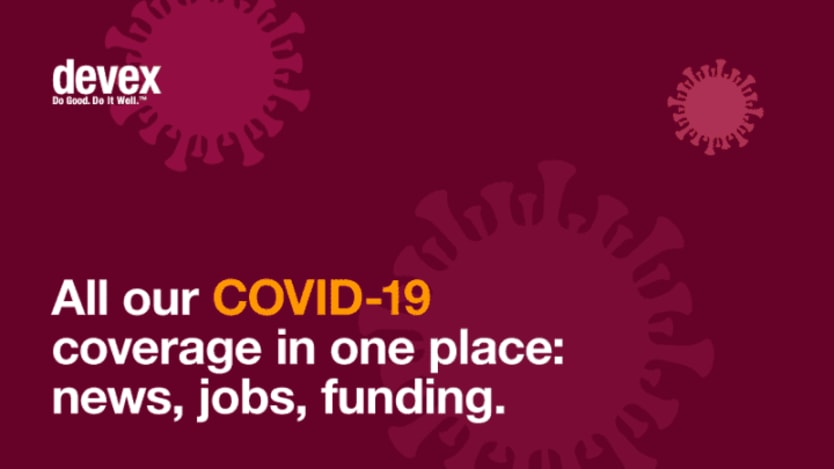
NEW YORK — The United Nations is tripling its appeal to fight the spread of COVID-19 in the world’s poorest countries, asking for $6.7 billion in a crisis requiring an “extraordinary response,” according to U.N. Emergency Coordinator Mark Lowcock.
“If we don’t help those countries, we will find we have a much bigger humanitarian problem in six or nine months’ time,” Lowcock told Devex Editor-in-Chief Raj Kumar in a recent interview. “If we put in place … not a business-as-usual response, an extraordinary response, recognizing we are in an extraordinary situation to finance greater social protection provisions, we can avoid cases growing to unmanageable levels. But we need to act fast.”
UN air bridge plan is ready but lacks funding to take off amid pandemic
COVID-19 has grounded commercial flights, pushing the World Food Programme to seek alternatives with chartered flights and new regional air hubs. The plans are in place but still require the funding to be realized, a director of operations at WFP tells Devex.
Lowcock announced the expanded funding request Thursday alongside World Food Programme Executive Director David Beasley and U.N. High Commissioner for Refugees Filippo Grandi, among other humanitarian experts.
COVID-19 has quickly spread around the world, with over 3.8 million confirmed cases and more than 266,000 deaths as of Thursday. But the peak of the disease in many low-income and fragile countries is not expected for another three to six months, according to OCHA.
“Why hasn’t it spread as fast? Maybe that is to do with the restrictive measures that lots of countries have put in place. Maybe it’s we are not seeing the whole thing because of testing in many countries. But maybe one thing we do not know is if the virus behaves differently in different circumstances, among different demographic groups,” Lowcock said.
But Lowcock has observed a clearer trend: economic and broader public health losses in low-income countries. The impact of government shutdowns and travel restrictions are already visible, from lost jobs to children missing vaccinations and meals. Last month, WFP warned that the number of people suffering from food insecurity could double because of the pandemic.
“If you have that kind of problem [with COVID-19] in the poorest countries, it doesn’t stay in the poorest countries. These problems spread.”
— Mark Lowcock, emergency relief coordinator, United Nations“There’s a growing economic calamity with a huge contraction in the world’s most vulnerable economies — a shooting-up of the poverty rate for the first time, actually, in 30 years,” Lowcock said.
OCHA estimates that $3.7 billion is needed to support coronavirus-related humanitarian work. An additional $1.9 billion is needed for immediate health needs, and $1 billion is required for logistics — for the recently established U.N. air bridges, for example — to facilitate travel and delivery of supplies. Part of the logistics funding would also support new field hospitals that the U.N. is setting up for humanitarian workers who become sick.
“That is at an advanced stage of development, and we hope to be up and running with some of those field hospitals shortly,” Lowcock said.
The U.N. first issued a $2 billion appeal for its humanitarian response to COVID-19 on March 25, and has since received more than $1 billion from governments, Lowcock said.
The U.N. plan has been expanded to include nine additional countries, including Pakistan, Sierra Leone, and Liberia. It prioritizes three issues: containing the spread of the disease, decreasing the loss of human rights and livelihoods, and protecting refugees, migrants, and people displaced within their own countries — all of whom are considered particularly vulnerable to the pandemic.
The actual amount that the U.N. and other humanitarian organizations need to control the pandemic and protect 10% of the world’s most vulnerable, though, is likely much more expensive, totaling over $90 billion, according to Lowcock.
“That is a lot of money, but it is equivalent to 1% of the global stimulus package that the rich countries put in place to protect the world economy,” Lowcock said.
“If the world makes strategic, smart investments earlier to contain the economic damage, then the chance of an economic recovery is higher. If those things aren’t done, I think what we will end up with is a much more expensive, longer-lasting problem,” Lowcock continued.
OCHA plans to issue another appeal for COVID-19 response work in June.
Lowcock said that two-thirds of the requested $6.7 billion can be provided by international finance institutions. While many high-income countries are narrowly focused on their own domestic responses to the coronavirus, he said, support for lower-income nations will ultimately bolster all countries’ ability to fight the pandemic.
“If you have that kind of problem in the poorest countries, it doesn’t stay in the poorest countries. These problems spread. Increasingly, decision-makers in the rich countries understand there is a national interest, as well as a human empathy and generosity case, for helping with that part of the problem,” Lowcock said.
Visit our dedicated COVID-19 page for news, job opportunities, and funding insights.









